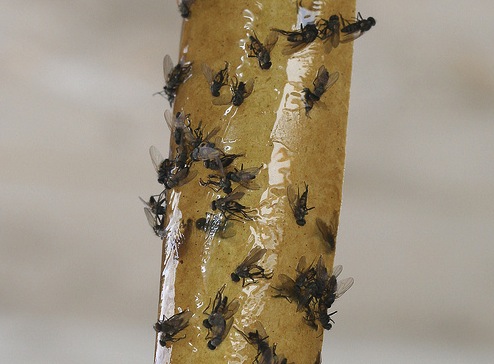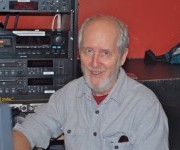Alex Smith.Photo: Philip SmeltzerAlex Smith has been a back-to-the-lander, a private investigator, a print journalist, and a researcher, and he now combines those experiences to find and interview authors, scientists, and activists (many of whom you’ll never hear from anywhere else), for his indispensible radio program and podcast about the climate crisis, Radio Ecoshock. Produced from a home studio in Vancouver, B.C., and broadcast on a growing list of college and community radio stations (50 at last count) in the U.S., Canada, the U.K., and Australia, I thought it a good time to ask a few questions of him, for a change.
Q. Who was your favorite guest recently?
A. That’s a tough question. There have been so many. Maybe Emily James, the British filmmaker, and producer of the climate film The Age of Stupid. I’ve just seen an advance copy of her latest movie, Just Do It, a behind-the-scenes look at young climate activists in the U.K. They plan zany actions, like supergluing themselves on the trading floor of the Royal Bank of Scotland to draw the world’s attention to the bank’s funding of dirty coal plants. Just Do It also visits the “climate camps” that pre-dated the Occupy movement in the U.S. There are a lot of similarities. North American activists can learn from the Brits. James and her crew are still looking for more funding to get distribution of the film in the U.S. and Canada.
Q. What’s the most undercovered climate issue?
A. It’s all undercovered when it comes to climate, but I’ll pick peat fires. Peat is organic material compressed over a long time, just one step away from coal. There are huge deposits of it in the tropics. Burning peat in Indonesia helped set record emissions and a global heat wave in 1997 and ’98. Indonesian peat is on fire again in 2011 as corporations clear away jungles and swamps for palm oil plantations for production of supposedly green biofuel, sold mainly in Europe.
Even more frightening to the few scientists who cover this are the emerging peat fires in the Arctic. Across northern Canada and Russia, peat is starting to burn, releasing large amounts of carbon dioxide. There are no news cameras there, and no way to contain the fires. Neither country wants to monitor these emissions, since they are both fossil-fuel producers with an agenda to deny or minimize climate change. If all the Arctic peat burns, our civilization — and maybe our species — is toast.
We need an emergency scientific program to monitor peat fires, and methane emissions in the Arctic. The more emissions from that region, the less we can burn in our transportation and industrial systems further south.
Q. Where do you think we are on the road to full-on climate crisis?
A. From the scientists I interview, severe climate change is a given. It has already started, but much worse is to come. Now we fight to prevent the worst, to stop a catastrophe from damaging the world of our grandchildren, and their grandchildren.
Q. Your view seems pretty dim on the prospects of nuclear to be a part of the solution.
A. I’ve lived in the shadow of a faulty nuclear plant. Now here on the West Coast, my family just got hit with another dose of radiation from the Japanese Fukushima disaster. There is no safe way to dispose of nuclear waste and no safe place to go.
Are you willing to risk everything for more energy? To give up the state of California, or New York, or wherever? Those are the stakes. We don’t need such gargantuan risks, now that we have safe renewable energy. It’s cheaper too.
Q. What sources do you rely on most to keep informed?
A. I subscribe to two news services that cost about 10 bucks a month: carolynbaker.net and Michael Ruppert’s collapsenet. These pinpoint stories in the major media and alternative sources. I stop daily at Joe Romm’s Climate Progress blog. To keep track of Fukushima (where three reactors are still melting down!), the best is ex-skf.blogspot.com.
I’ve given up on the big American TV networks as hopeless propaganda. Foreign services like the BBC, or even Russia Today and ABC Australia, are more useful. I get most of my news tips from blogs and from listeners. Radio Ecoshock has great activist listeners all over the world who keep me informed with the latest.
My daily cruising also includes a lot of financial sites, like Zero Hedge and The Automatic Earth. I’d like enough warning to duck if an extreme economic crash comes, although I’m not sure what any of us can do. I may run away to the mountains.
Q. What other radio shows or podcasts do you recommend?
A. “The Climate Show” from New Zealand helps with the latest science. That podcast also has John Cook, who debunks anti-science and the “global warming does not exist” cult on his blog “Skeptical Science.” Radio National in Australia has “The Science Show” with Robyn Williams. For a fun look at the “banksters” who are plundering our world, I download the Max Keiser radio show from Resonance FM in London, which also broadcasts Radio Ecoshock.
Sadly, America has lost two of its best environmental shows. Sure, NPR has “Living on Earth,” which is kind of a nature program, rather than anything activist-related. Without corporate advertising, Betsy Rosenberg had to give up on the Air America show “Ecotalk.” And in the summer, one of our best green broadcasters, Daphne Wysham, stopped producing “Earthbeat,” at least for a while, due to funding problems. Green radio just doesn’t pay, even as we need this news so badly!
Q. How does economic contraction fit into your view of the overall challenges we face?
A. The West has wasted its productive resources on McMansions, oversized vehicles, and phony banking scams. We should have built high-speed rail, a new energy grid, and established local foodsheds for security. Now it looks like we won’t even be able to repair the ongoing damage from climate-induced storms, much less start large projects.
The good news is that economic insecurity is driving Western citizens to question everything. People are choosing self-sufficiency out of self-defense, joining initiatives like the Transition movement.
Q. What do you recommend people do to be ready for the changes on the horizon?
A. Number one is to realize big government is not going to save you, and big
corporations will just make it all worse. Knowing that, we have to rebuild family networks, and start new community action groups for survival in very difficult economic times, and in an unstable climate.
At a personal level, I recommend that a year’s supply of food be stored away, just as the Mormons used to do. That’s because industrial agriculture is unstable and unsafe. So is the economy. Freaky weather may wipe out crops, and ever-rising energy prices will translate into higher food prices. If you have a food buffer, that gives you and yours extra time to adapt, or move if you have to.
Learn how to can and dry food when the harvest comes in. You save a bundle, and get the best food. But individualism won’t make it in the longer run. We do this together, or fail.
Q. What gives you hope?
A. Seeing people get off the couch, away from TV dreams, and into the streets. Electronic life is really anti-life. We have serious things to do. Consider donating your TV time to a local charity, a Transition group, local politics, protests, or whatever moves you. We need to get going.
Listen to Alex’s show at ecoshock.org or subscribe to the free podcast. All past programs with experts, scientists and authors interviewed on the show are available as free MP3s. If your local radio station is not carrying Radio Ecoshock, ask them to get on board. It’s free for any station to broadcast. Send requests to radio@ecoshock.org.



